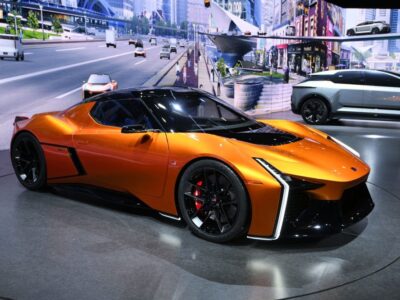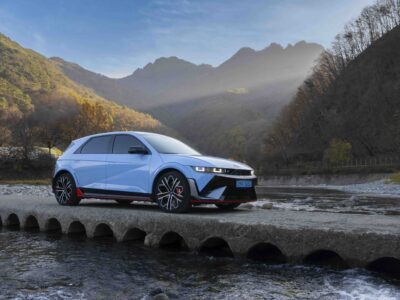(Bloomberg) —
For two companies struggling to stem losses and sort out operational issues, Aston Martin Lagonda Holdings Plc and Lucid Group Inc. are awfully boastful about their plans to join forces.
“I should be knighted for what I’ve done,” Aston Martin Chairman Lawrence Stroll told reporters Monday, hours after his carmaker said it would pay about $232 million to access electric vehicle components from Lucid. Combine that amount with the $225 million minimum that Aston Martin agreed to spend on Lucid parts, and it’s not far off the £408 million ($519 million) cash balance the UK company ended last quarter with.
Lucid Chief Executive Officer Peter Rawlinson described the tie-up as validation — the company laboring through the production ramp up of its debut model, the Air sedan, won out over Aston Martin’s longtime partner, Mercedes-Benz Group AG.
“Aston Martin is showing both on the road and track an uncanny ability to choose the right partners for powering both race cars and road cars,” Rawlinson said, stroking the ego of his counterpart whose Formula 1 team is having a breakout year. “Thank you for your wisdom of choosing us, sir.”
In reality, this alliance — struck just before electric-truck maker Lordstown Motors Corp. filed for bankruptcy — was only the latest indication of how difficult the switch to batteries from combustion will be. Both the petrol heads at Aston Martin’s headquarters in Gaydon, England, and Lucid’s engineering whizzes in Silicon Valley have had a rough go.
Stroll has steadied Aston Martin, to a degree. But the Canadian who made his fortune in the fashion industry acknowledged he didn’t have any idea what he was getting into when he threw the company a lifeline in early 2020. Its targets for roughly five years from now for £2.5 billion revenue and £800 million in adjusted earnings are well short of what Ferrari NV already brings in annually.
Aston Martin’s new relationship with Lucid is one of necessity. It will continue to operate on a shoestring budget over the next half decade, budgeting just £1.8 billion of capital expenditures during that span. The company will pay for Lucid’s technology in part with newly issued shares, handing over a 3.7% stake.
Rawlinson, who was chief engineer of the Model S at Tesla Inc., knew before the Air went into production that Lucid would be in for a long haul. Years before the company merged with a special purpose acquisition company to go public, his plan was to supplement the carmaking business with revenue from supplying tech to other manufacturers.
Lucid still ended up underestimating how difficult manufacturing the Air would be, making just 7,180 last year, a fraction of its original target for as many as 20,000 cars. This year, it’s expecting to produce at least 10,000 sedans, and analysts are expecting free cash flow to be roughly in line with last year’s $3.3 billion outflow.
Whereas Lordstown’s best hope for a rescue fell through — iPhone maker Foxconn Technology Group pulled out of a production partnership — Aston Martin and Lucid share a deep-pocketed white knight in Saudi Arabia’s sovereign wealth fund.
Five months after saying Aston Martin had plenty of cash, Stroll announced in July of last year that it was raising money by selling a stake to the Saudi government-controlled Public Investment Fund. The PIF now owns about 18% of the company.
The fund took an even greater interest in Lucid last month by anchoring a $3 billion stock offering, increasing its stake to more than 60%.
Stroll downplayed PIF’s role in Aston Martin and Lucid coming together, saying that while the fund suggested that the two should talk, the companies had been having discussions the last 2 ½ years.
“This required an industrial solution,” Stroll said of his Aston Martin turnaround effort. “An industrial solution in the best of times could take anywhere from five, to seven, to 10 years. I’m very happy to say that industrially, we’ve turned this place around in three years.”
Whether that declaration of victory is premature or not — Aston Martin expects to generate cash from 2024 onward — Rawlinson will look to make a similar case soon, in part by building on this first win for Lucid’s tech-sharing division.
“Just as we started up with a high-end product with Lucid Air, and we’re going to go more mainstream,” Rawlinson said, the Aston Martin deal will herald “more widespread adoption and applications of our technology in the future.”
–With assistance from William Wilkes.
To contact the author of this story:
Craig Trudell in London at ctrudell1@bloomberg.net
© 2023 Bloomberg L.P.





